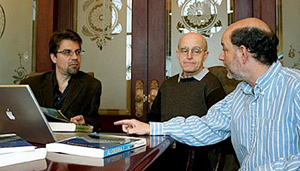Scientist’s Legacy Is Revolutionizing How We Learn
By Shilo Raube
 John R. Anderson believes that one of the things that makes humans unique is our ability to pick up a brand new skill — whether it’s driving a car or solving math problems. This notion has driven Anderson to spend the past four decades researching how the brain works and creating better ways for students to learn.
John R. Anderson believes that one of the things that makes humans unique is our ability to pick up a brand new skill — whether it’s driving a car or solving math problems. This notion has driven Anderson to spend the past four decades researching how the brain works and creating better ways for students to learn.
Anderson, the R.K. Mellon University Professor of Psychology and Computer Science, joined the Carnegie Mellon faculty in 1978 and developed the Adaptive Control of Thought (ACT) theory, which provides an overall organization of human thought and cognition. He then took the theory a step further and led a team that created an intelligent computer tutor to teach algebra to high school students, essentially re-defining the field of cognitive psychology by doing what is often impossible: taking a theory and applying it in a real-world setting.
For these achievements, Anderson recently received the Benjamin Franklin Medal in Computer and Cognitive Science, an honor given to trailblazers in science, business and technology. Previous honorees include Albert Einstein, Thomas Edison, Frank Lloyd Wright and Allen Newell, the late CMU professor and one of Anderson’s mentors.
“Much of the research at CMU is done at the boundaries between disciplines,” said John Lehoczky, dean of the College of Humanities and Social Sciences. “John is an excellent example of the way in which his work integrates cognitive psychology with computer science and education.”
Anderson’s cognitive tutor program was so successful that Carnegie Learning, a spin-off company, was created to develop the computer tutors as a commercial product. To date, more than half a million students in 2,600 schools across the U.S. have used the tutoring software.
Steven Ritter, who worked as a post-doc in Anderson’s lab, co-founded Carnegie Learning with Anderson and is the company’s chief scientist.
“We take very seriously the idea that the more we know about how students learn, the better the instruction that we can build based on that,” Ritter said. “We try to build software that knows how students learn and tries to understand each individual student’s approach to a problem and deliver instruction to each individual student.”
Another project that Anderson’s research has fueled is the Pittsburgh Science of Learning Center (PSLC) — a joint CMU and University of Pittsburgh center that will receive almost $50 million in grant support from the National Science Foundation. Ken Koedinger, a former student of Anderson’s, is leading this initiative as director of the PSLC.
“The center’s goals have been to identify what conditions cause robust student learning, and we’ve been leveraging computational theory of the kind that well represents John’s ACT theory to help understand those conditions,” said Koedinger, professor of human-computer interaction and psychology. “The idea that we can really understand in much more detail what makes learning things harder for students and how we can make it easier has tremendous potential.”
In addition, Anderson has influenced generations of students. Marsha Lovett, associate director of CMU’s Eberly Center for Teaching Excellence and associate research professor in the Psychology Department, had Anderson as her adviser and found him to be a great role model.
“John balanced being directive and being open with me as his Ph.D. student,” she said. “He influenced my research in that he has always been interested in unifying, looking at more than one single, isolated phenomenon and seeing how the mind and brain works together. I think that is completely appropriate because we have this one mind we use to do everything in our daily lives. So, trying to develop models that achieve that same level of complexity and integration is a great goal.”
Anderson also has had an impact on his fellow faculty members.
“I’ve known John for decades, and one way he has impacted the department and university is through his terrifically high levels of aspirations, the tremendously high standards he sets for himself, his goals and how hard he works to meet them,” said Marcel Just, the D.O. Hebb Professor of Psychology. “It sets standards for those around him.”
Anderson’s high standards and pioneering work have helped establish CMU as a leader in cognitive and brain sciences and lay a solid foundation for future research. Michael J. Tarr, co-director of the Center for the Neural Basis of Cognition (CNBC), credits Anderson for continually pushing the boundaries and taking risks.
“New and exciting research tools, such as functional magnetic resonance imaging (fMRI) and white matter fiber tracking, in conjunction with CMU’s field-leading development of modeling and analysis techniques are helping us to understand what’s happening at multiple scales within the living human brain: at the single neuron level, at the scale of thousands of neurons interacting with one another, and at the network level of interactions between brain regions,” Tarr said. “Taken together, we are gaining an emerging picture of how the brain gives rise to behavior, thought, intelligence and action, as well as understanding the computations underlying these domains so that we can build intelligent machines.”
Tarr added, “CMU is uniquely poised to integrate across levels and methods because of our excellence in these many areas — in no small way due to John Anderson.”
